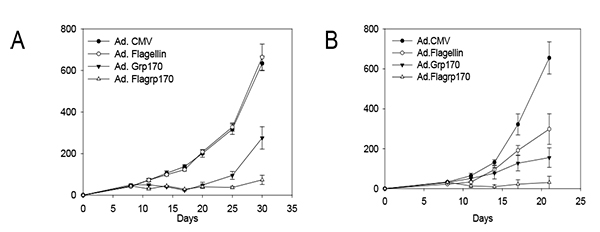Biomedical
Novel Molecule for Immunotherapy and Vaccine Formulation
Cancer immunotherapy consists of approaches that mobilize components of the immune system as cancer treatment. Pattern recognition receptors such as the toll-like receptors (TLRs) play an important role in the activation of innate immunity. Ligands for TLRs are now being explored as immunostimulant molecules for producing anti-tumoral responses and for use as an adjuvant along with vaccines. Many established and experimental vaccines incorporate agonists for TLRs to protect against infectious diseases, as well therapeutic immunization against cancer. Among TLR ligands, Flagellin has been shown to serve as a potent systemic adjuvant. Stress proteins or heat shock proteins, such as Grp170 can also be utilized as immunostimulatory adjuvants to develop vaccine approaches. Large stress proteins are currently being tested as a vaccine adjuvant for melanoma therapy.
The technology
Researchers at Virginia Commonwealth University have engineered a secretable hybrid chaperone (Flagrp170), which combines the immunostimulating activity of Grp170 and Flagellin, is a novel peptide developed to promote antigen presentation and systemic immune activation, resulting in an effective vaccine response and therapeutic control of cancer and other diseases. This fusion construct, when administrated into the tumor tissues via viral expression, leads to effective control of both local tumors and distant metastases. Flagrp170 is more efficient in generating a therapeutic response than either Grp170 or Flagellin alone. In addition, Flagrp170 can be used to create a recombinant vaccine by forming a chaperone complex with a protein antigen, resulting in antigen-specific antitumor immune response. Therefore, it can be used in both genetic and protein forms to promote immune-stimulatory presentation of self/ tumor antigens.

Figure 1. Intratumoral administration of Ad.Flagrp170 markedly inhibits the growth of prostate (A) and colon (B) tumors.
